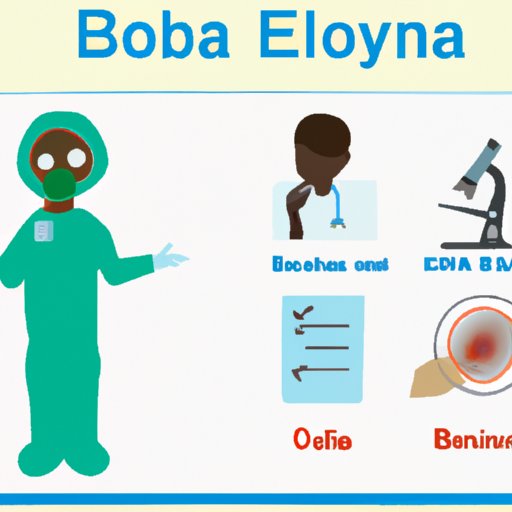
Introduction
The Ebola virus outbreak is a global concern, with devastating effects on affected communities. The virus is known for its high mortality rate, making it crucial to identify symptoms early for proper treatment and prevention. The purpose of this article is to provide readers with an informative guide to recognizing and understanding the symptoms of Ebola.
Ebola: Recognizing the Symptoms before it’s Too Late
Early detection of Ebola symptoms is vital for improving survival rates. According to the World Health Organization, patients treated early have a higher chance of survival. Therefore, it’s important to know how to spot the signs of the virus and seek medical attention promptly.
The Tell-Tale Signs of Ebola: A Comprehensive Guide
Ebola is a viral infection that spreads through contact with bodily fluids. The virus can cause a range of symptoms, ranging from mild to severe. Common early symptoms include sudden fever, muscle pain, weakness, fatigue, and headache. As the virus progresses, patients may experience vomiting, diarrhea, and a rash. In severe cases, Ebola can cause internal bleeding and organ failure.
The onset of symptoms can take anywhere from two to twenty-one days after exposure to the virus. However, most people develop symptoms within eight to ten days.
Why Early Detection of Ebola Symptoms is Vital – And How to Do It
Early detection of Ebola symptoms is crucial for preventing the spread of the virus. If you suspect you’ve been exposed to the virus or have symptoms, seek medical attention immediately and inform healthcare providers of your concerns. Symptoms to monitor for include:
- Fever
- Fatigue
- Muscle pain or weakness
- Vomiting and diarrhea
- Difficulty breathing or swallowing
- Hemorrhagic symptoms, such as bleeding inside and outside the body
From Headaches to Hemorrhaging: The Range of Ebola Symptoms
Symptoms of Ebola can vary widely, with more severe cases causing serious complications such as hemorrhaging. While such symptoms are uncommon, they require urgent medical attention. These symptoms may include:
- Bleeding from the eyes, ears, or nose
- Severe abdominal pain
- Difficulty breathing or swallowing
- Cramping, swelling, or joint pain
- Organ failure
Ebola: What to Know About Its Symptoms and How to Protect Yourself
Along with early detection, prevention measures are vital for stopping the transmission of Ebola. You can protect yourself from Ebola infection by:
- Avoiding contact with infected animals, such as primates and bats
- Avoiding contact with infected bodily fluids, such as blood, vomit, or sweat
- Washing your hands frequently with soap and water, and avoid touching your face
- Practicing safe sex by using condoms
Ebola Symptom Checker: Is It Time to See a Doctor?
If you are experiencing symptoms of Ebola or have been in contact with someone who has the virus, consider seeking medical attention. Here are some common symptoms of Ebola, along with corresponding recommendations:
- Mild fever, muscle pain, or weakness: Monitor symptoms and seek medical attention if they persist.
- Vomiting, diarrhea, or a rash: Contact your healthcare provider immediately.
- Severe abdominal pain, difficulty breathing or swallowing, or organ failure: Go to the emergency room immediately.
Conclusion
Recognizing and understanding the symptoms of Ebola is essential for early detection and prevention. By identifying the signs of the virus early, you can prevent its spread and seek timely medical attention. Remember to practice good hygiene practices, avoid contact with infected animals or bodily fluids, and seek medical attention if you suspect you have Ebola symptoms.





